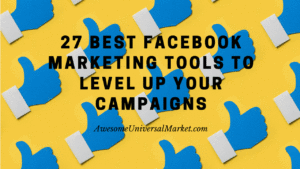How to become an affiliate marketing expert and make a living promoting nothing but your virtual affiliate links?
It’s critical to know where to begin when learning how to become an affiliate marketing expert. It’s all too tempting to put the carriage before the horse, and that metaphor applies to several situations. Finding merchant partners and high commission affiliate programs demands a significant amount of upfront work before you can even contact a merchant. In this article, we will cover all the essential things you need to know to get started and become an affiliate marketing expert.
What Exactly Is Affiliate Marketing?
Affiliate marketing is a business model in which you receive a fee for supporting the goods or services of another business.

Affiliate marketing is also sometimes known as performance marketing or pay-per-action marketing. Affiliate marketing is distinguished from other types of digital marketing by its definition.
Although it is a form of online advertising, affiliate marketing is not the same as simply hosting ad banners.
Unlike ad banners, affiliate marketing typically does not pay you until a visitor “converts.”
Conversion is typically described as a transaction made by the prospect (the visitor to your site). However, some merchants interpret “conversion” in a particular way. It may be as complicated as a customer buying a product and taking a particular action after purchasing.
How Does Affiliate Marketing Work?

This is how affiliate marketing works at a high level:
- A blog reader reads an article on your website.
- After that, the visitor clicks on an affiliate link, which takes them to the merchant’s website.
- The visitor then completes the desired action on the merchant’s website.
- The event is attributed to the affiliate.
- The affiliate is paid a commission.
How Much Will I Earn as an Affiliate Marketer?

As with any company, the profit potential is limitless. You can read more about affiliate marketers’ earnings in our previous post.
I personally know bloggers who earn more than 5 figures a month from affiliate marketing. However, many bloggers earn a few thousand dollars per year — a decent side hustle.
Remember, affiliate marketing is what you make of it, how well you implement it, and how much work you put into your blog. It is not a get-rich-quick scheme, nor will you become a millionaire overnight. You can make a side hustle of it, or you can make a full-time job and income. The sky is the limit.
Where to Get Affiliate Links To Promote?

Affiliate Networks
Working with a network affiliate program entails collaborating with a third party to handle your partnership with the merchant. An affiliate network, in general, handles contact, affiliate links, monitoring, reporting, and payment.
Thousands of merchants are usually available via Affiliate networks. You enter the affiliate network and then apply to each merchant program individually. Some will accept applicants automatically, while others will manually check and approve new affiliates.

You will have access to affiliate links that are exclusive to you once you have been accepted. These one-of-a-kind links can be put anywhere you want to promote the merchant’s product. On your blog, in an email, or on your YouTube channel, among other places.
Make sure you understand where your affiliate links can and can not be placed. Most merchants, for example, prohibit you from bidding against their brand name with Google Ads or claiming to be the brand. Before promoting, always check the restrictions; otherwise, the merchant may ban you.
Affiliate networks have several advantages over in-house affiliate programs, including the following:
- They serve as a middleman between you and the merchant.
- They ensure that commissions are paid on time.
- They allow you to collaborate with thousands of merchants from a single dashboard.
- They act as auditors of the merchant’s conversions to ensure all is in order.
- They will ensure that affiliate clicks and conversions are tracked more accurately.
- They do more detailed reporting than in-house affiliate programs.
The Best Affiliate Networks in 2021
- CJ Affiliate (formerly Commission Junction)
- ShareASale
- ClickBank
- Amazon Associates
- eBay Partner Network (EPN)
- Pepperjam
- Rakuten Marketing (formerly LinkShare)
Affiliate Programs Managed in-House.
You usually work much more closely with the merchant and have a much stronger partnership with an in-house affiliate program.

Affiliate links are obtained from the merchant’s affiliate program in the same way as they are obtained from affiliate networks. The merchant is in charge of conversion monitoring. Unfortunately, you have no way of knowing whether a merchant is falsifying conversions and must rely on the merchant to make timely payments.
The advantages of an in-house partnership include:
- A stronger bond with the merchant
- Payouts are typically higher than those available for public network affiliate programs.
- More adaptable options to boost conversion rates
Choose a Niche
Now that you have decided if you will opt-in for an in-house affiliate program or a network, the next step is to decide what niche you will promote. The first step in learning how to become an affiliate marketing expert is determining which affiliate goods to sell. To do so, you must first see the big picture.
Every affiliate marketer has a specific niche in which they attempt to influence their audience. However, if you are too ambitious and attempt to target too many affiliate marketing niches, you risk overextending yourself and rendering your efforts ineffective.

But the first move is to figure out who you’re going to hit. But just because it’s first doesn’t mean it’ll be fast.
Finding your niche is one of the most important aspects of getting started with affiliate marketing. The wrong niche will make selling more difficult, while the right niche will make it simpler.
So, how do you determine which niche is best for you?
To begin, conduct a brief self-assessment. Since affiliate marketers are expected to be dependable advocates for a product or brand, you must ensure that you are in the right frame of mind.
Begin by asking questions such as:
- What are some of my interests?
- Do people look for my chosen niche?
- Will the market for my niche remain stable?
- Is there a lot of competition in my niche?
- Is it possible to find affiliate programs that fit my chosen niche?
Even if you’re just making and paying for online ads, your niche will make or break your affiliate marketing efforts.
These questions may help you determine if the product you’re considering is one you’d like to endorse on a regular basis. These are the critical questions to consider regardless of the type of affiliate marketing strategy you eventually select.
Start a Blog
After you’ve decided on a niche, the next move is to start a blog. Although it is possible to earn money through affiliate marketing without having a blog, I do not recommend it. You need a blog and organic search traffic to be the foundation of your affiliate marketing plan.

Yes, you can make money on YouTube or Pinterest, but you do not own these channels.
You have ownership and power over a blog. Other channels, such as social media, can only be “rented”. You could be the hottest Instagram star since the Kardashians, but if Facebook decides it no longer likes you, your company could go out of business… overnight.
This has happened far too many times to other affiliate marketers. Don’t build your business’s base on the sand.
Consider a blog to be the nucleus of a bicycle. Your blog serves as the hub for:
- Email,
- Paid traffic,
- Facebook,
- TikTok,
- Instagram,
- YouTube,
- Push notifications,
- and other channels.
These channels are the means by which you can draw traffic to your blog.
Produce (A LOT of) Content
You want to build content for your blog because it is the foundation of your business. Search Engine Optimization (SEO) is the best way to get people to read your blog. While you can consider other methods of expanding your audience, organic search remains the most efficient.

According to GrowthBadger’s study, organic search generates the majority of website traffic. Since Google is the most popular search engine, you must be present on Google to be identified. Yes, you can concentrate on social media, podcasts, and paid traffic, but if you don’t focus on SEO as a blogger, you’re losing out on a massive audience.
Before moving on to the next step, I suggest writing at least 25 articles. These should not be short 500-word updates but rather lengthy, in-depth articles about your niche. For example, don’t write articles about your cat if you’re in the weight-loss niche. Instead, maintain your focus and write about the niche you set out to create.
This move cannot be skipped. Before you even consider applying for affiliate programs, you must have a fully functional website. If your blog lacks content, you will not only have an audience, but you will also have no hope of being accepted by an affiliate manager.
As a result, map out the 25 articles you want to write before you start. Produce keystone articles that are simple to rank for. I strongly advise you to purchase a keyword analysis tool such as Ahrefs. A keyword analysis tool is priceless.
There are also some free options available.
Google Ads, Google Trends, and Google’s own search engine results are all excellent free resources for finding new subjects to write about.
Content creation is one of the final steps in your pre-affiliate journey. In this way, it’s also the start point for your affiliate marketing activities. It doesn’t matter if you’re just blogging or publishing ads; once you’ve reached this point, you’re on your way to learning how to become an affiliate marketing pro.
There’s a reason why the term “content is king” is used so often in marketing. The Internet is, in many ways, just a selection of content. People will not come to you if you do not participate.
As we’ve seen, the content can be as straightforward as this blog post. However, it is ultimately up to you how you deliver value.
But what kinds of content can you create to help you stand out as a reliable and valuable affiliate marketer? Even if you have the perfect niche and a flawless website, you still need something to grow your audience.
You have a lot of choices when it comes to the type of content you want to make. Indeed, one blog listed 113 different types of content that can be created and shared. So, where do you start with so much variety?
Although this comes down to the ideas that concern you the most, there are at least three good places to start that affiliate marketers are familiar with. They can all contribute to success, so we’ll go over them one by one.
Product Reviews
Writing reviews for various goods and services in their niche is one of the most popular templates marketers use while learning how to become an affiliate marketing guru. Ecommerce sites are always searching for product reviews that convert consumers, so this can be a lucrative place to start.

It can provide a smooth transition into affiliate marketing activities and be a lucrative income source when done correctly.
TheBestVPN, for example, is a website that reviews the most popular Virtual Private Networks, or VPNs, on the market. This kind of website is a goldmine of knowledge for audiences interested in cybersecurity and maintaining their information security.
Each review includes a link to the site where readers can learn more about the VPN. As you would expect, this link will be an affiliate link that directs each referred buyer to a chosen VPN’s website.
The platform places itself as a high-authority outlet for newcomers to the field of cybersecurity by concentrating solely on product reviews. Additionally, all involved benefits from the affiliate partnership, completing the ideal affiliate marketing model.
Blog Posts
Blog posts, including product reviews, are another way to start building confidence and making inroads in your chosen niche. But, more importantly, when you learn how to become an affiliate marketer, which is your ultimate objective, blog posts will help you increase sales over time.
By answering popular concerns or issues in your target market, you will be putting yourself in a position to make recommendations later on.

Consistency is crucial when it comes to writing blog posts. You must post on a regular basis and maintain a clear voice that offers high-quality ideas and tips to your readers.
So, if you’re looking for a place to start but don’t want to do product reviews, consider blogging. Offer solutions and share as many tips as you can.
Guides
The final type of content you can concentrate on creating is an informational product that you can use as a hook to entice people to read more of what you have to say. Like the previous two forms of content, helpful guides will lead to increased sales and more money in your wallet.

This can be an ebook, an email collection, a webinar, or some other form of a detailed, in-depth examination of a specific subject. You’ll be one step closer to building confidence in your niche if it’s reliable and helpful.
You will eventually use this approach to help your audience develop an interest in your market’s affiliate product.
This ensures that their audience is constantly engaged with high-value content. And, of course, it receives a commission on each purchase made as a result of their recommendation.
As we’ve seen throughout, creating a website is just one choice for learning how to become an affiliate marketing professional. Ads are a great marketing tool that can help you succeed, particularly with high-paying affiliate programs.
But what if you just want to use paid ads to direct people to your merchant partner’s website? You don’t even need a website in that situation.
Instead, you’ll need to create an account in order to create ads, which means you’ll need to use either Google ads, or Facebook ads, or even Bing ads depending on your target audience.

So, first and foremost, let’s go over how to get started with Google Ads. To get started, navigate to the Google Ads homepage and click the Get Started button.
You’ll be taken to a screen that asks for your email address and the website to which you want to send ads.
If you’re creating ads with a Google account, you’ll be prompted to sign in.
Following that, you’ll be guided through the process of targeting and finishing your ad, including photos and copy. But, first, decide on a target for your advertisement.
Since you’re most likely trying to persuade users to purchase a product, you can choose the ‘Take action on your website’ option. You can guide and monitor traffic even if you are not the website’s owner.
Following that, you must choose the geographical area in which you want to advertise. Again, you can make it as wide or as narrow as you want.
If you’ve determined the venue, you’ll need to narrow down what you’re offering. Google Ads will recommend products and services based on the content of your website that will help you narrow or broaden your audience.
After you’ve finished describing your product or service, you’ll need to produce the final advertisement. Then, you can edit the copy of your ad and finalize how it appears on a search engine results page on the next screen.
When you’re done, all that’s left to do is finish publishing your ad and make any necessary changes. You will have successfully built both your site and your content at this stage.

Another excellent choice is to set up Facebook Ads to meet your target audience. First, you just need a Facebook profile, which you might already have. If not, it is simple to set one up.
After logging into your Facebook account, navigate to the dropdown menu in the upper right corner of your Newsfeed. Next, you should click the “Create Ads” button.
This will take you to Facebook’s specialized Ad Manager. There’s a lot to learn and try, but your first move should be to create your ad. Then, you’ll be guided through the process, just like Google Ads, beginning with the home screen. To get started, go to this section:

Based on your testing, you’ll choose your target, build your ad, and fine-tune your schedule and budget. You’ll need to spend some time familiarizing yourself with the site and what your target audience is searching for, much as with Google Ads.
However, not all ads are the same. There are numerous approaches to creating an ad, just as there are numerous approaches to creating blog content. Let’s take a look at one of the options provided by Google as an example.
Conclusion – How to Become An Affiliate Marketing Pro?
In the affiliate marketing business, you must leverage the most effective strategies to attract an audience and establish relationships with them. This can be accomplished by creating a website to refer customers to goods and services or by running a paid ad campaign to target relevant target audiences.
Whatever approach you take, the steps outlined in this article will make your path as an affiliate marketer far easier in the long run.



Average Rating